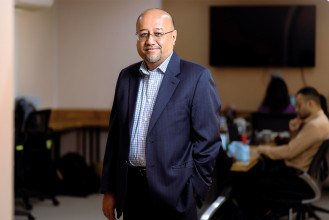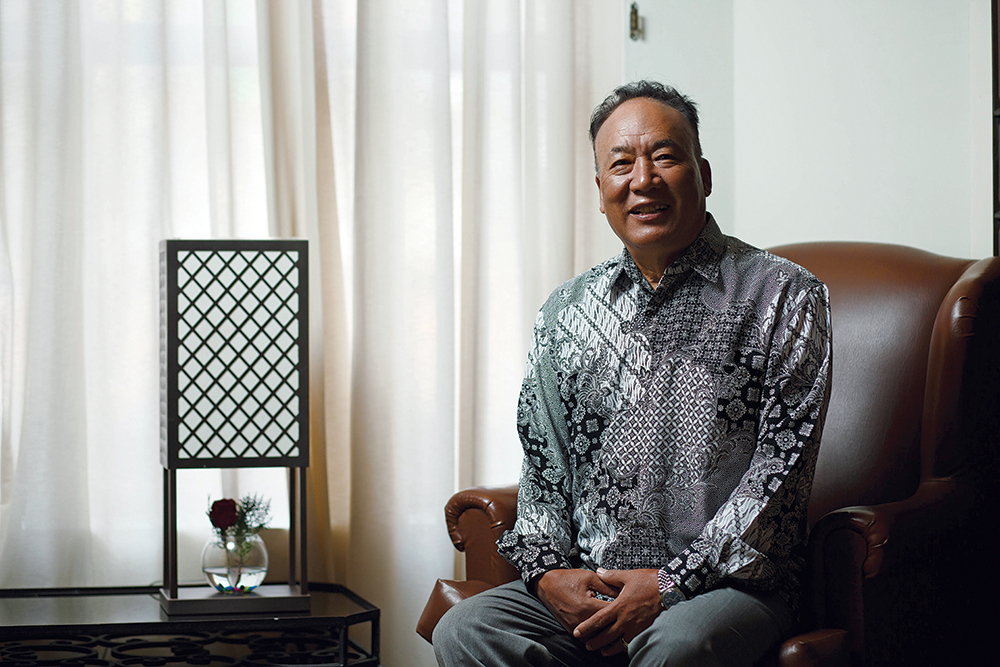
Tashi Ghale
Chairman, Hotel Royal Singi
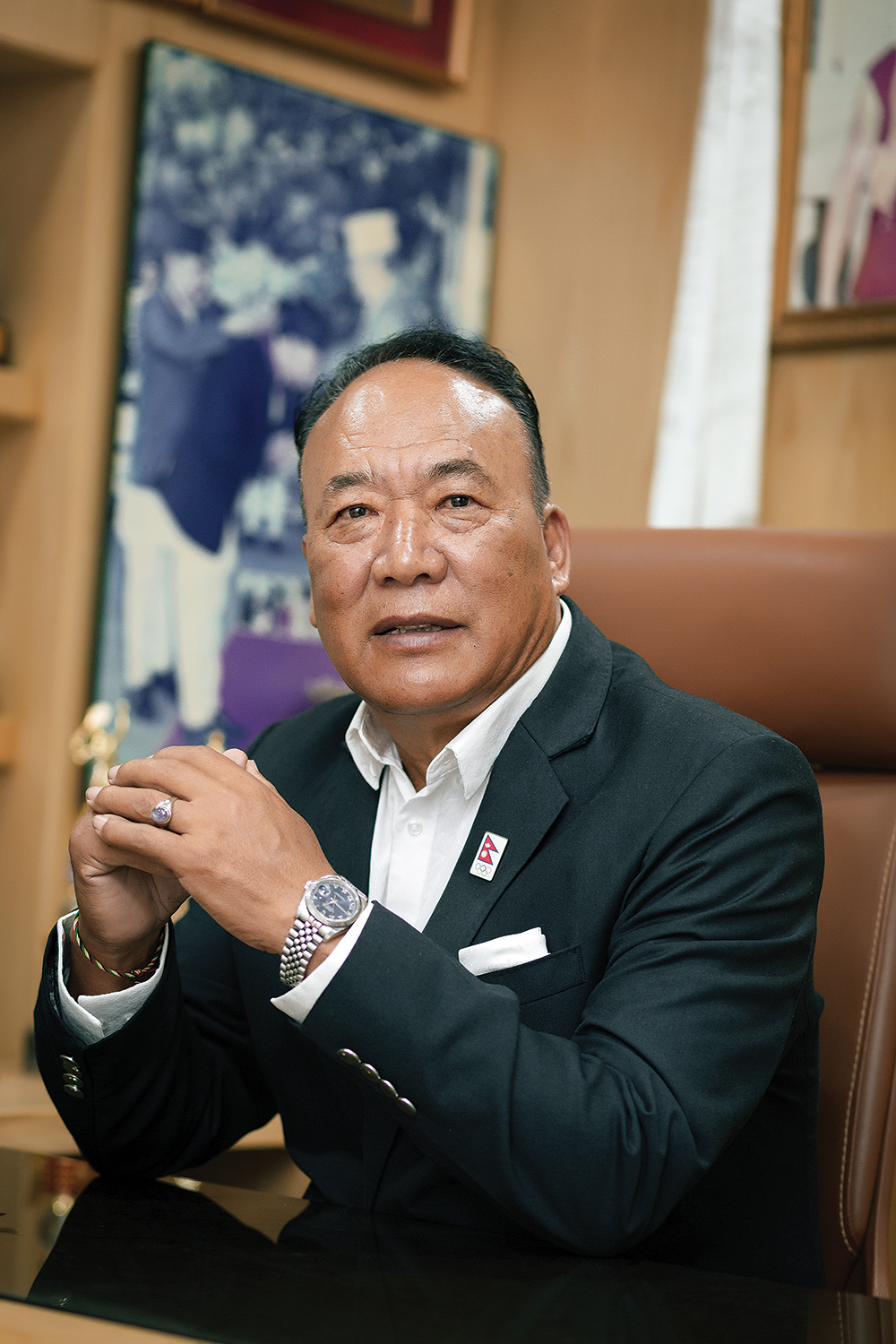
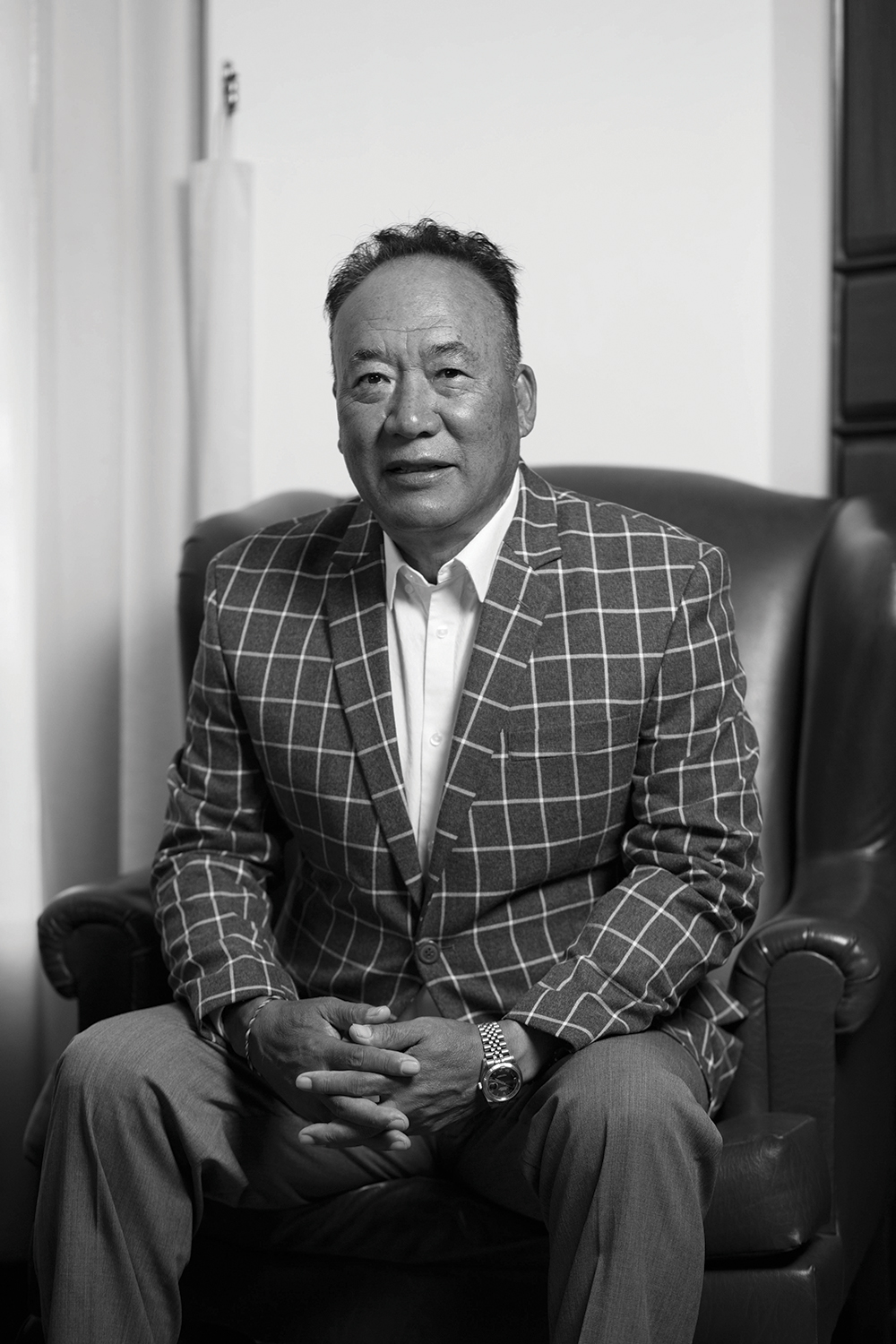
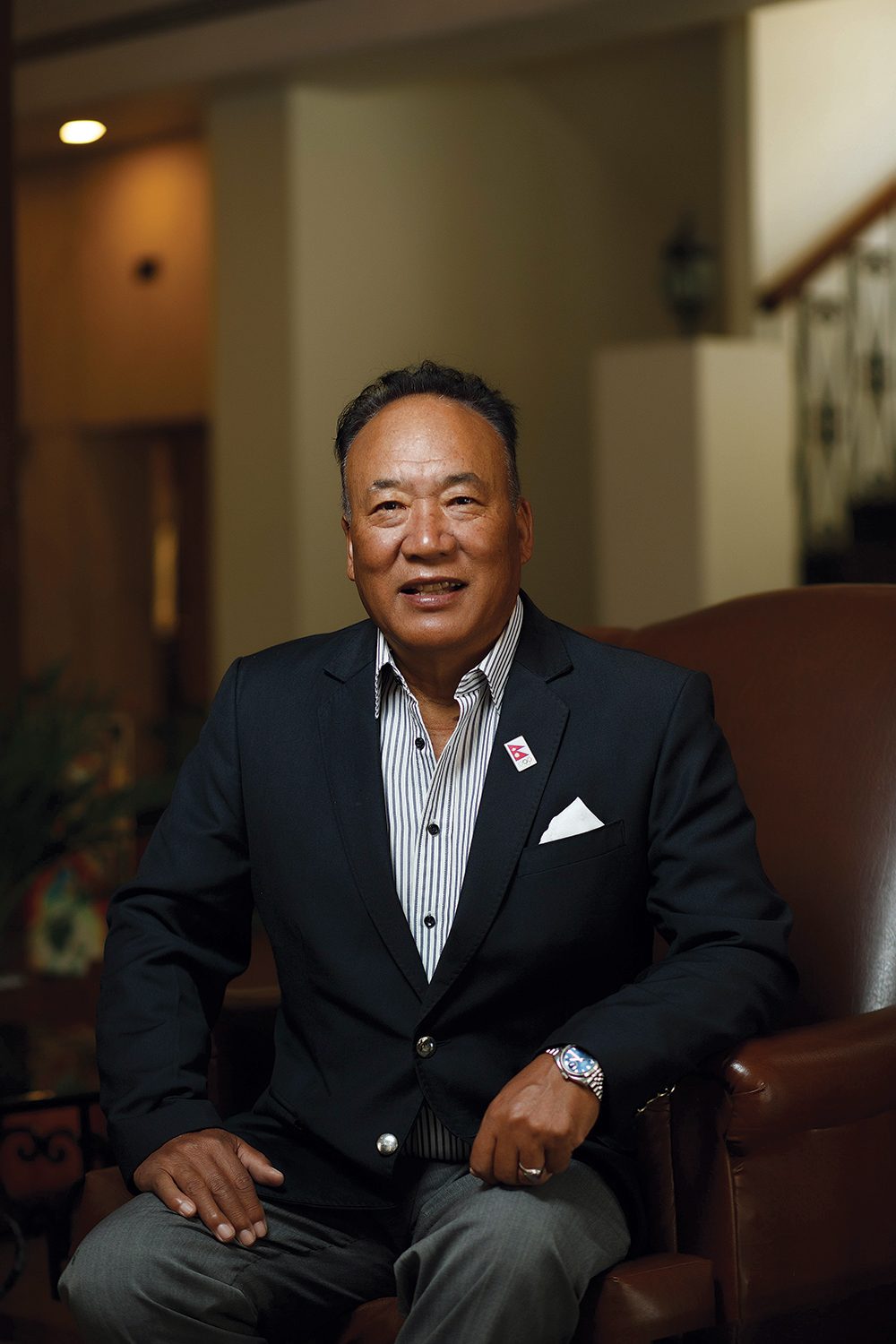
Hotel Royal Singi completes 25 years in business and at the heart of its hospitality values is its founder Tashi Ghale’s values for exemplary guest service and the commitment to walking the extra mile in all they do.
The beautiful structure of the Hotel Royal Singi stands in the heart of the capital 25 years since its establishment as a testimony to the passion and hard work of its founder Tashi Ghale, the Chairman of the hotel. Born in remote Manang, Ghale got into business at 15 years of age. Ghale followed the path of his ancestors and village folk when he entered the tradition of trading in gemstones. “There was a trend back then when people would live in the village for only three months and for the rest of the time, they would go to India, Malaysia and Singapore among other countries for trade,” he reminisces. Most families were involved in trading of gems and precious stones, he shares, adding, “People would buy these stones in Myanmar and sell them in other countries.” A few years on, Ghale decided to change his line of business and got into garment and handicraft trading. It was during one of these business trips that he got impressed by the number of foreign tourists visiting these nations. “It was especially in Penang, Malaysia that I got fascinated by the sheer number of foreigner visitors I saw there and thought that maybe I should enter the tourism sector,” he recalls. And that marked his foray into the hospitality business. An avid sportsman, Ghale did archery and horseback riding in his younger days. He also played football and helped set up the Manang Marshyangdi Football Club, and is a staunch golfer. He has not only represented the country at the Asian Games three times but has also helped produce and mentor a lot of golfers in Nepal with the recent success of both individual and team gold medals at the SAFF games. “I think God wanted me to not just be a businessman but also a sportsman and a social worker and I am content that I have been managing to do that,” he reflects. A man who believes in fate, Ghale today is a satisfied soul who says we are all born with our destinies predetermined. He elaborates, “We are all born for a purpose and success does not only mean having the best of the materialistic world, it means being able to touch the lives of people you meet along this journey called life.” As the hotel, a landmark in the capital, celebrates 25 years of establishment, Business 360 spoke to the very versatile hospitality entrepreneur and large-hearted personality, Tashi Ghale, about various aspects of his life and his views on the tourism industry. Excerpts:
Could you tell us about your early years
I was born in a small remote village in Manang and since it is a very cold place nothing grows over there. There was an age-old tradition in my place whereby people, usually the males, would travel to other countries to do business. People would go to Myanmar and buy gems and other precious stones and sell them in other places like Malaysia, Singapore and Thailand, to name a few and my father too decided to get me involved in this business. Back in 2023 BS, during Late King Mahendra’s visit to our village, he asked the people about the problems they were facing. There were two major problems that the village folks apprised him about which were the difficulty in obtaining a passport and lack of proper roads. What used to happen back then was that we used to travel to India and get an Indian passport and then travel to other countries. Road connectivity was also really bad and it would take a week to reach Manang from Lamjung. Immediately after the late king returned to Kathmandu, he issued an order to the concerned authorities to make it easy for people of Manang to obtain passports and within a year I also came to Kathmandu and made my passport. And then I started travelling abroad for my business trips. I was only 15 years old when I first went to Kolkata in India with my father and later with my uncles to other nations for business. There was a lot of travel involved back then and that continued for many years. During these business sojourns, I decided to change the line of business as it was getting difficult to do business in Myanmar. I decided to take handicraft items from Patan abroad and bring sarees from Singapore and garments from Thailand. Business was good and gradually during my travels, I was fascinated by the tourism industry especially in Penang and also Thailand which was receiving huge number of tourists from across the world. I, thus, decided to establish a 55-room hotel called Hotel Thamel in Thamel. There were not many hotels in Kathmandu during that time and Hotel Thamel did good business. That is how I got into the tourism sector.When and why did you decide to open Hotel Royal Singi?
Hotel Thamel was doing good but the problem was the area was already quite congested and big tour buses could not enter the area. Tour operators suggested it would be better if I opened a hotel somewhere else which was easily accessible. I then started scouring for locations and got the opportunity to buy the land and build Hotel Royal Singi at the location we are currently in. We started construction in 1995 and in January 1998 we opened the hotel.What are some of the challenges you have faced since opening Hotel Royal Singi?
I was very happy the day we opened the hotel as it was like a dream being fulfilled but we have been through a whirlwind of challenges over the past two decades. There were continuous political developments and changes through the years that had an adverse effect on the tourism industry of the country. We then had to contend with the earthquake of 2015. Whilst we were gradually recovering, we had to go through the closures of the Covid pandemic that brought the entire tourism industry to a complete halt for months. It would also be beneficial if the trade union, government and owners are on the same page with mutual objectives as opposed to self-direction. There should be more collaboration between such involved bodies and this goes for all businesses, because one cannot do without the other. We should always look for amicable solutions for everything. The other aspect that affected us tremendously was the period when we had to deal with 18 hours of load-shedding a day. The problem with hotels is that even if there is only one guest, we have to have the lights on, the air-conditioners have to be working, or else you have to close the hotel entirely. Using a generator for 18 hours daily does not make any economic sense really. Moreover, with problems with the availability of diesel, we literally had to have another backup generator on standby. What I am proud of is that I have been providing quality service to the guests who come to Kathmandu, and I am also proud that Royal Singi is not like the other hotels you would find in any other country. We have focused on providing our guests a traditional Nepali experience. I have used bricks from Bhaktapur for instance, I have laid emphasis on the smallest of details so that any foreigner staying with us gets the Nepali experience. And I am proud of that.Tell us more about this 25-year journey with Hotel Royal Singi.
There have been many ups and downs in this 25-year journey but we have been able to rise above all challenges. Migration and export of skilled labour is a vicious cycle of turnover that often puts our organisation at peril in recruitment and re-training. However, I am happy to also see many of our employees who have gone abroad for employment. This, in a way, shows that we have had a positive impact on the lives of many people. If you also assess the trajectory of inflation in the country over the last two decades and the increase in costs of doing business and compare it head on with the rates of revenue earned by hotels; it is a constant battle of being able to sustain the business year by year as competition increases with the number of hotels in the city.
Are there any policies you would like introduced or amended for the betterment of the tourism sector in the country?
There are many areas that both the government and stakeholders have to look into. The number one priority I would say is from the moment a tourist touches down at the airport, they should be provided with the best hospitality. The feeling should be such that ‘Nepal provides what I am looking for’. Tourists need to be given an experience they can talk about when they return. For instance, Bhutan has made changes in its tourism sector since last year. Previously, by paying a daily fee of $200-250 one would get an all-inclusive package. However, at present tourists have to pay a daily Sustainable Development Fee of $200, which does not include the charges for food, accommodation, transport, and everything else that used to be part of the package. It might sound like a huge amount but they have a system whereby the guest is looked after from the moment they arrive till their departure. However, in Nepal, things are a bit haywire including manipulation of hotel room rates (especially in Kathmandu) as per demand and volume which adversely affects the positioning of Nepal as a tourism destination. I would like to suggest the government make certain guidelines based on which hotels are built, classified, rated, priced and operated not only during opening stages but also annual audits be conducted to ensure standards are being met not only in terms of product but also in terms of services provided. Hotels need to be recognised as an industry and be extended subsidies and exemptions that are currently not being provided like on property tax. Subsidies are not being provided on electricity tariffs too. The government should also provide incentives and introduce rules taking into consideration the investment that business owners are making. The major problem for investors or any business person at the moment I would say is the inconsistency in the interest rates being charged on loans by banks and financial institutions. It would be of great help if the interests were stable because this allows you to plan for the long term. At present, interest rates have been fluctuating or rather I would say consistently rising, which is a deterrent to investors. I am sure a lot of business owners are facing problems due to this persistent hike in interest rates. Another aspect I want to touch upon here is regarding the foreign currency that tourism businesses earn and deposit into the Central Bank. The tourism sector is probably one of the highest contributors to the country’s foreign exchange reserves and in all these years Hotel Royal Singi has deposited a substantial amount of foreign currency at Nepal Rastra Bank. Taking this into account, the government could ease the business climate by providing incentives and streamlining the process of renewing the foreign currency exchange permit which is cumbersome at the moment. Also, the auditing process needs to be looked into and be made more efficient. When procedures and processes are easy to follow it automatically boosts the confidence of the investor and creates a win-win situation for both the government and investors. Investors will not shy away from reinvesting and the government in turn will be able to generate revenue. Talking about incentives what I would like to mention is there is a guideline whereby hotels need to undergo renovation every five years. For hotels that follow this rule, the government could provide tax breaks. This will encourage more people to abide by the standards that the government sets. I think the government should be more sensitive towards the tourism sector because the sector by itself is of a sensitive nature.What is your opinion on the number of new hotels being opened in the country at a quick pace?
We do need hotels for the future. It has become a global trend for people to visit various places and even we Nepalis have started travelling to various destinations in the last couple of years. So, we will need hotels to accommodate the rising number of tourists in the future. But the sad thing is and I have done research, the problem is after Covid, tourists have started visiting other destinations but not many have come to Nepal. I was a bit confounded and did research on my own. What I found is that the biggest problem is air connectivity or rather the airfare. The airfare from the US to Bangkok and from Bangkok to Kathmandu is nearly the same. The second thing is that when tourists travel, they do so within a fixed schedule and they do not get flight tickets within that schedule. A factor that authorities have not looked into is when I first started my hotel business, Indian tour operators used to sell packages to Nepal too. They used to have packages from Benares to Kathmandu but now this has stopped. Tourists also used to transit from Kathmandu to Lhasa in Tibet and return via the same route. That also has died out. In fact, even for Bhutan, tourists used to transit from here and that also has closed down. So, when the number of tourists is decreasing, we have to think of other ways to attract them or bring in other types of tourists. We should focus on religious tourism I feel because that holds a huge potential. We have only focused on trekking and mountaineering. We also have potential for cultural tourism, sports tourism and adventure tourism. I was recently in Thailand and I saw Koreans and Japanese who had booked accommodations for nearly two months just to come and enjoy playing golf. So, they were booking hotels and the golf course. We have not looked into such things. The government has been only harping about trekking and mountaineering and this will not be enough. When tourists go on treks, they spend $35 to $50 per day per person which actually is not a good tourism income. When I enquired about golf tourism in Thailand, I learnt that each tourist spends at least $150 a day with the caddie fee and green fee included. So, with such fantastic weather all year round, we have a huge scope for golf tourism. Religious tourism could also be a big thing in Nepal because we have so many religious sites with the two main ones being Pashupatinath for Hindus and Lumbini for Buddhists, but we have not been able to attract the desired number of travellers. If you look at the market in Bodh Gaya in India, you will see they get about a million tourists who actually stay there for a couple of months. If such tourists come and stay for two months here it will be enough for the entire year. So, if policies are changed, I feel we could bring in the necessary number of tourists. Moreover, our country is a destination which is easy for Indian and Chinese tourists to visit.How can the government intervene to help uplift the sector?
It would be great if the government was a bit more open about listening to and implementing suggestions being provided by the private sector. At the end of the day, it is the government that needs to introduce and implement the required policies. For instance, we could develop a certain region on the model of Las Vegas that has thrived due to casino tourism or Vietnam that has thrived because of major investment incentives with the complete development of the Phu Quoc region. When the country has policies that further encourage investors then I am certain we will have more people investing in the sector. It is about streamlining the various policies that we have and their implementation. Initially, when I opened the hotel there was income tax break for the first five years. There was no service charge, no VAT. Right now, the bottom line income compared to operating costs of running a hotel let alone the various charges to be paid to the government and banks is not favourable. The only good aspect at present is that domestic tourists have also started visiting our hotel to dine or to host events and meetings. We hope things will change for the better from the government’s side in the near future.
What keeps Royal Singi going despite the challenges?
To be honest, it is not that I also had not thought about closing down the hotel. I had even thought of converting this space into a shopping or an office complex. I actually gave it a lot of thought to convert this property. But again, deep down the feeling of satisfaction that one gets when you open a hotel and people appreciate the service you are providing is unbeatable. For instance, there is an Indian guest who has been coming since the time we inaugurated the hotel. In fact, his son came to celebrate his 20th birthday here in the hotel. When I remember the faces of such guests, I don’t feel like closing down the hotel though that thought did come up quite a number of times. Yes, a business complex means good business taking into account the current trend but I feel a hotel plays an unmatchable role when it comes to getting other nationals to recognise the country. There is this weird sense of pride when I can proudly tell people that we have a hotel in Nepal that can not only match your requirements but we can exceed your expectations in delivering memorable experiences by staying at Hotel Royal Singi.Post-Covid has there been any help from the government at all for the recovery of the sector?
In the beginning, the government introduced a policy to give a break on the interest of loans for a year and they did reduce the interest rates a bit but that was for a short time period and has been removed now. And even when hotels were shut during the pandemic there was an agreement between Hotel Association Nepal and the trade unions to provide a certain amount of salary every month. Yes, we have to support our staff as much as we can. Even if the hotel is at a loss, we have to support them. What I am saying is like how we looked after our staff in such a difficult situation, the government too should look after us. It is not that the government did not provide any support at all. Since the two years of the lockdown affected businesses massively it would have been nice if certain incentives could have been continued for a longer time so as to help businesses get back on track. There is a new government and hopefully they will come up with better policies. There is enough space for the growth of tourism in Nepal because firstly we have fantastic weather and then nature has been very kind to us with all the mountains and rivers. Then we have sites of religious significance. The only thing lacking I keep emphasising is lack of proper policies. Unless the government has a policy in place then no matter how much an operator tries, they will not be able to do anything substantial.Royal Singi has become a landmark property for the capital. What do you feel led to this success?
One reason is that we are situated in a very suitable and central location. Secondly is our ability to not only develop but also nurture and maintain a harmonious relationship with all our business partners and vendors alike. Thirdly, our leadership team and associates who have always identified our DNA to provide exemplary service to guests to win their loyalty and lastly is our objective to continuously evolve where we have invested to upgrade and expand our services and amenities for our guests.How do you plan to celebrate the 25th anniversary?
Completing 25 years is a momentous milestone. So, although we are still trying to recover post Covid with all the hardships we have had to endure in the last three years, I seek to celebrate this special occasion by inviting all of our business partners, loyal clients and well-wishers for a grand cocktail reception. I would also like to take this opportunity to express my gratitude and appreciation to all those who have supported us through our ups and downs over the last 25 years. For our guests and local community, we will be featuring a variety of special limited promotions throughout the year so they can enjoy our amenities and services at the hotel. READ ALSO:
Published Date: January 30, 2023, 12:00 am
Post Comments
E-Magazine
RELATED In the Lead


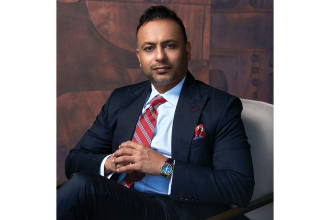
-1767340083.jpg)
